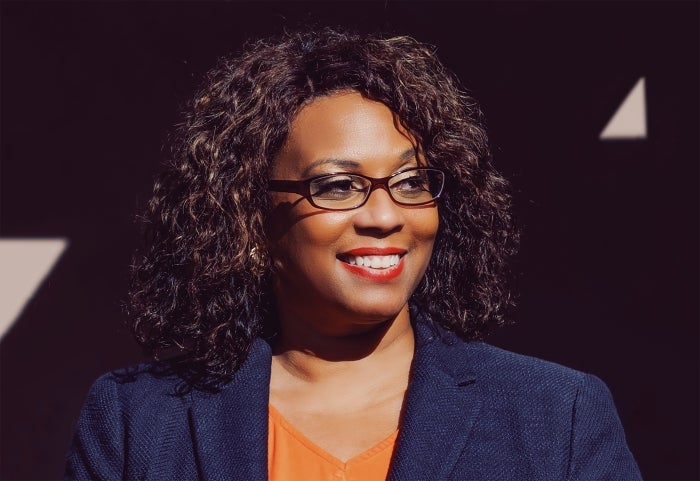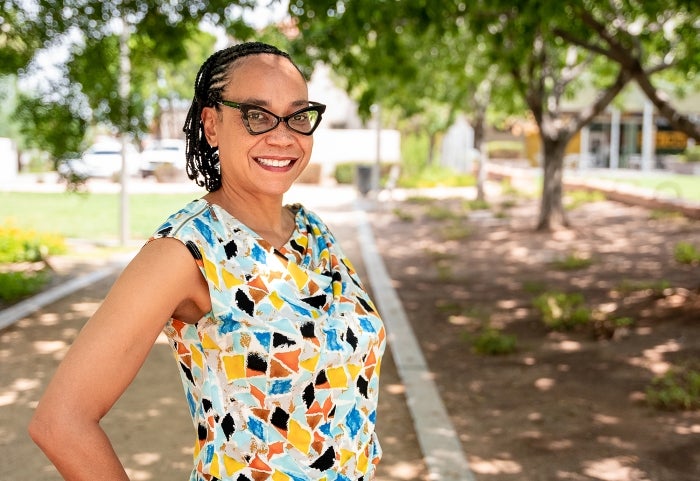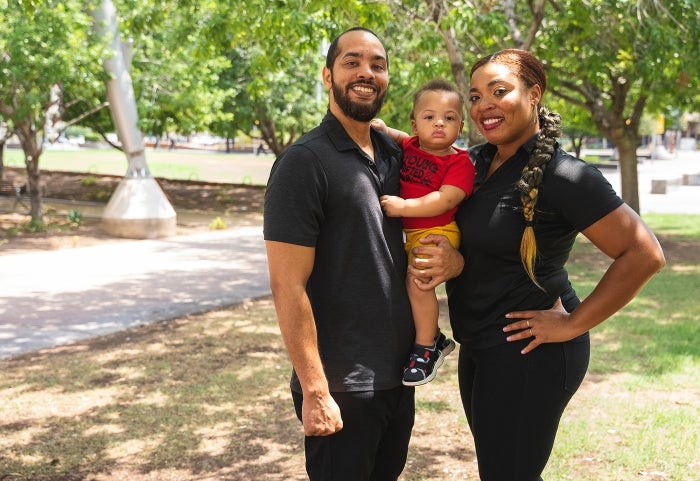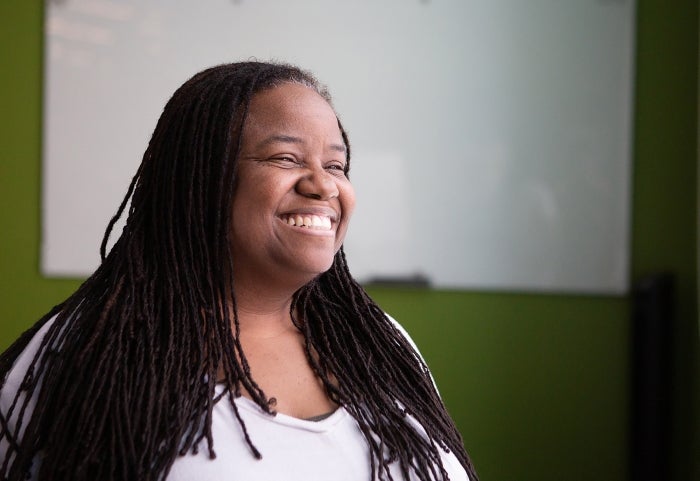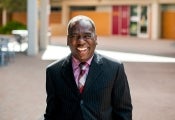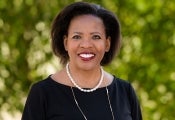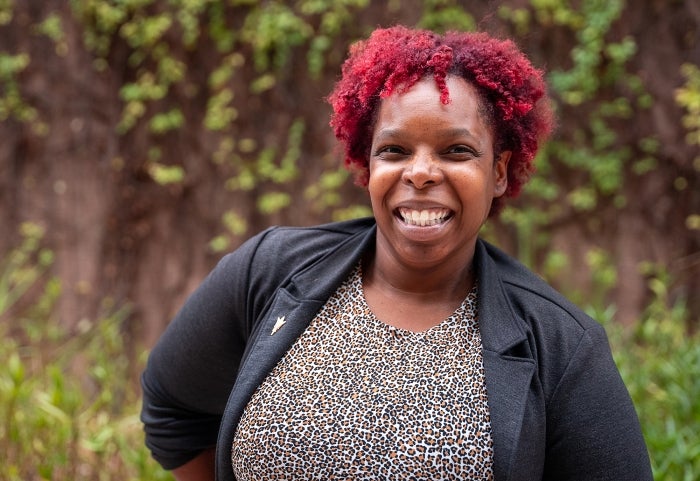ASU joins in celebration of Black Philanthropy Month

A graduate celebrates after the Black African Convocation with his family.
This year, Arizona State University will participate in Black Philanthropy Month. Throughout the month of August, ASU and the ASU Foundation will be taking time to celebrate Black donors and recognize the impact of funds that support Black students, faculty and programs.
Black Philanthropy Month is a global campaign to celebrate giving by people of African descent and promote equity in funding. The initiative was founded by Jackie Bouvier Copeland and launched in 2011 to commemorate the United Nations Year and Decade of People of African Descent. Today, Black Philanthropy Month is a program of the WISE fund, which engages more than 19 million people across 60 countries.
Kimberly Scott serves as the inaugural senior fellow at the ASU Foundation, where she researches diversity, equity, inclusion and justice within the ASU Foundation and other foundations across the United States.
Much of Scott’s role at the ASU Foundation is to make sense of national research within a local context and provide suggestions to the foundation as to how it can best promote diversity, equity, inclusion and justice. As part of her research, Scott visited a conference hosted by ABFE, a philanthropic partnership for Black communities.
“It was there that I learned about Black Philanthropy Month,” Scott said, who is also the founding director of ASU’s Center for Gender Equity in Science and Technology and a professor in the School of Social Transformation.
Scott saw an opportunity for ASU to innovate racial justice work in the university context and recommended that the ASU Foundation celebrate Black Philanthropy Month.
“It’s a global campaign to encourage Black people across the globe to give to nonprofit funds and invest in Black businesses,” said Kenja Hassan, who serves as the assistant vice president of cultural relations in ASU’s Office of Government and Community Engagement.
In addition to addressing systemic issues in the distribution of charitable donations and business investments, the campaign works to expand conventional understandings of what philanthropy – and philanthropists – look like. Black philanthropy often goes underappreciated, and Black philanthropists often go unrecognized.
“The lack of conversations around Black people in philanthropy, at its most insidious, has roots in the stereotypical devaluation of Black people,” Hassan said.
According to Hassan, anti-Black racism and political expedience have encouraged depictions of Black people as recipients of aid and discouraged images of Black people as agents of change.
“When in reality, Black folks in the United States have been part of philanthropic giving in multiple ways since our time in this country began,” she said.
Hassan and others point to a wide range of historical and contemporary examples – including the abolition movement, the civil rights movement, faith-based initiatives, community organizing and support networks between Black families – to show the variety of Black generosity.
“We always think of it, in the modern context, as the giving of large sums of money,” Hassan said, “but when you look at the word, philanthropy is love for other human beings and desire to support other human beings. And African Americans have been doing that in ways that the larger society can’t necessarily see.”
“Philanthropy comes in different forms,” Scott said. “African Americans have a history of philanthropic giving. The history, however, has not necessarily been recorded beyond giving monies.”
Hassan is excited that ASU is participating in Black Philanthropy Month and considers it an important way for the university to live its values.
“It’s part of embracing our (ASU) Charter, of being measured by whom we include and how they succeed,” Hassan said. “Our charter says that we take responsibility for the communities we serve. It’s really important for ASU to think specifically about each community it’s serving because Arizona is a range of communities.”
Hassan sees Black Philanthropy Month as an opportunity for ASU to demonstrate care for Black communities, support philanthropic efforts within Black communities and understand charitable giving in different ways. She also hopes that ASU might inspire other universities to participate in Black Philanthropy Month.
“This gives us another way to celebrate the Black philanthropists in our midst and also celebrate the ways ASU contributes to and supports Black life in Arizona and across the globe,” Hassan said. “It’s celebrating culture, celebrating history, bringing to light the funds that were created by people who wanted to see Black people in this community be successful.”
“We have grown as givers, and that’s something to celebrate throughout the month of August,” said Kim Covington, who worked in television news for 30 years before transitioning to full-time nonprofit work. “What I’ve seen in my research – and what I’ve seen in the community – is that we are givers. We have never called ourselves ‘philanthropists,’ but we’re learning how to do that and learning how to do it more strategically.”
Covington is an ASU donor who has volunteered for multiple leadership positions at the university over the years. She currently serves as vice president of community initiatives at the Arizona Community Foundation. Part of Covington’s work at the foundation is to support giving circles, groups of people who pool their donations to make a significant impact.
“Whenever we’re working together, whenever we’re collaborating – putting a little bit of money in a big pot – we can change the world,” Covington said, giving the example of a women’s giving circle that commissioned a study on the vast racial disparities in maternal mortality rates.
Covington also organizes the foundation’s Black Philanthropy Initiative, which supports local charities and small businesses through grants, marketing expertise, business education and technology resources.
One small business owner couldn’t get a loan for nine months while her business struggled to stay afloat. The Black Philanthropy Initiative helped her build relationships with financial institutions, and within eight weeks, she secured a loan. Today, her business is thriving and recently expanded from one location to three.
“It’s not like we’re just awarding a grant and forgetting about it,” Covington said. “We’re learning. We’re getting involved. We arm them with knowledge. We want them to succeed. We’re tailoring our strategy to make a huge impact.”
Scott stresses the difference between racial equity and racial justice within the context of philanthropy. Racially equitable philanthropy is “giving money to a sociohistorically marginalized group in order to equalize the experience of that group relative to others.” Racially just philanthropy is “giving money to a sociohistorically marginalized group in order to provide that group with the resources they deem necessary to build their own capacity.”
Scott thinks that Covington’s efforts at the Arizona Community Foundation fall into the second category.
“That’s much different,” Scott said. “And we don’t see that a lot.”
Although this form of giving is rare within formalized philanthropic efforts, Scott thinks it’s becoming more common.
“More collectives of philanthropists or individual philanthropic organizations are understanding the value of ‘nontraditional’ forms of giving,” Scott said.
Covington knows firsthand the impact that this more holistic approach to philanthropy can make.
As a child, Covington wanted to be a journalist but was unsure if such a career was open to her. One day her aunt heard on the radio that a group of journalists was holding a summer workshop at a local community college. Every Saturday, Covington’s aunt drove her to the community college. And every Saturday, the same group of television anchors, newspaper editors and radio hosts came together and volunteered their time to teach aspiring journalists.
“They really changed my trajectory,” Covington said. “I was from east St. Louis, and I didn’t see anyone who looked like me who was a journalist. And it wasn’t until that workshop that I knew I could do it. That’s when I learned that giving works, that giving has impact. I’ll never forget them.”
Over the course of her journalism career, Covington went on to win multiple Associated Press awards for investigative work and four Emmy Awards for excellence in reporting.
Shayla Cole has been a member of ASU Black Alumni since 2009 and currently serves as president of the organization. During her time with ASU Black Alumni, which often funds scholarships for current students, Cole has seen how philanthropy can make a difference.
“Generosity is extremely important,” Cole said. “When the community comes together and gives, it goes back into the community.”
Cole hopes that her work with ASU Black Alumni might inspire others to serve their communities.
“I believe representation matters,” Cole said. “Knowing that I'm in a leadership role, I want to continue to be a role model for others.”
Cole specifically hopes that her work might help others see that service doesn’t have to compete with other obligations.
“You can have a family. You can work. You can do all that you want to do,” Cole said. “If I’m here to show that you can balance it all, the next person who sees me might say, ‘I could do the same thing.’”
“When Black people go to work in institutions of higher learning, the majority of them are bringing with them a ‘give back’ mentality,” Hassan said. “Those folks come with an attitude of ‘I have to give back to the rest of the community’ – it’s an obligation, a duty.”
As the unrest of 2020 refocused a national conversation on racism, individuals within Arizona State University came together to identify and address the ways in which ASU was falling short in its mission to serve all students, faculty and staff.
Kissa Powell, an ASU staff member at the EdPlus Success Coaching Center, volunteered on committees and helped facilitate these conversations.
“I saw that a lot of people were in pain, including myself,” Powell said. “I really wanted to take the small role that I have in leadership and use that as a platform to help people get the support that they needed.”
In partnership with ASU President Michael Crow and other senior leaders, committees of faculty and staff across all of ASU’s campuses collaborated to develop the LIFT Initiative, an unprecedented series of 25 actions to support Black communities at ASU.
The initiative set out to enhance diversity, growth and opportunity for Black students, faculty and staff. The plan also outlined steps to expand ASU's academic offerings, community services and collaborative relationships to benefit all underrepresented groups and individuals at ASU.
Jeffrey Wilson, associate dean of the W. P. Carey School of Business, and Colleen Jennings-Roggensack, vice president of cultural affairs for ASU, were appointed by President Crow to lead the Advisory Council on African American Affairs, which helped develop the LIFT Initiative.
"It is our belief that the work of the council will enhance the lives of Black/African Americans and ASU through President Crow's LIFT Initiative," Wilson and Jennings-Roggensack said in a joint statement.
A year after the initiative launched, the university had already taken considerable steps towards its goal, revamping To Be Welcoming modules, inviting guest speakers to lead discussions around social justice, opening four Multicultural Community of Excellence locations, and funding dozens of new fellowships and assistantships for Black students.
The LIFT Initiative has directly benefited thousands of people, and its impacts will be felt for generations to come. But the LIFT Initiative simply would not have been possible without Powell and other people from across ASU who dedicated their time, talent and effort to the cause.
“In a university environment, one of the ways Black employees are philanthropic – in the sense of wanting to ensure the success of other human beings – is they will give a lot of time to informal mentorship of students and peers,” Hassan said. “And a lot of times, that extra effort isn’t recognized.”
LaToya Grigler, a senior counselor at ASU Counseling Services, works with students and student organizations, like the ASU Black African Coalition, as part of her job. But she also donates her time and expertise to these organizations outside of work hours.
“I’m supporting them after hours – yes, after hours – but I don’t mind because it’s important,” Grigler said. “The students need to see us. They need to know that we care in more ways than one.”
Grigler enjoys using her expertise to help those around her, and she hopes that more people will think of giving in a wider sense and find creative ways to give.
“Money is great,” Grigler said. “Time is even better.”
Grigler says that it might seem difficult to get involved, but there are countless opportunities. She says reaching out to someone – anyone – is the easiest way to get started.
“Connect with somebody at ASU,” Grigler said. “Even if they’re not the right person, they will talk to somebody who will talk to somebody who will get you involved.”
“Having a voice is so crucial,” Powell said. “I started off with just trying to create a space for people to express themselves, to seek help if needed.”
“If you don’t have money to support us, come join an event,” Cole said. “There’re so many different ways that you can give back.”
“You don’t have to be rich to be a philanthropist,” Covington said. “You can look at some of the problems in your own neighborhood and give. If we all do that, we can change the world.”
“I think the first thing is to recognize, in your own heart, the value of giving in different forms,” Hassan said. “Make the decision that generosity, care, concern and empathy are an important part of your being.”
After that, Hassan said, “there are millions of ways to give back.”
More University news

ASU PD, international students help keep campus safe through revived program
With four campuses spread across metro Phoenix and an in-person student population exceeding 78,000, the Arizona State University Police Department is charged with safeguarding a community that is…

ASU 1 of 21 R1 universities recognized in new Carnegie classification for student access and earnings
It is a headline that could have been missed in the blur of daily news about American higher education: The Carnegie Foundation for the Advancement of Teaching and the American Council on Education…

The power of purpose: ASU scholarships emphasize service to community
It was the 1970s.A young Jim Armstrong was what he calls a “hippie.”Like many hippies of his generation, he decided to hit the road. Hitchhiking across Canada, Armstrong found himself in the city of…


